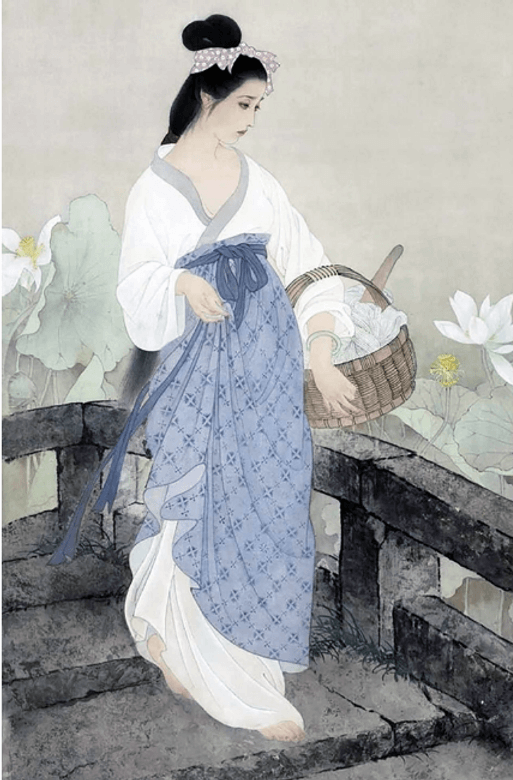A Country-woman of Yuqian
- Poetry of Su Shi

A country-woman in farm dress and skirt blue Reveals her frost-white bare feet for she wears no shoe.
A silver hairpin passing through her tousled hair, Like shuttle in a loom she wades in wind and rain.
Hers is the dress that ancient palace maids did wear: People cannot forget their former master's reign.
Willow catkins begin to fly beside the brook Which sees her pass across with her pencilled eyebrows.
The woodman comes back, they exchange an amorous look And won't believe on earth there is a happier spouse.
In 1093, Su Shi inspected Yuqian area where the Wu-Yue culture had flourished since the early Han Dynasty. The traditional dress, the silver head coverings, and the charming openness of Yuqian women took his fancy. In contrast would be the courtesans, the mythical ladies and the various ideal women of some folklore. Again, catkins are associated with softness and the feminine in culture, with true love and spiritual nourishment.
青裙缟袂于潜女,两足如霜不穿屦。
觰沙鬓发丝穿柠,蓬沓障前走风雨。
老濞宫妆传父祖,至今遗民悲故主。
苕溪杨柳初飞絮,照溪画眉渡溪去。
逢郎樵归相媚妩,不信姬姜有齐鲁。
- Why Chinese poems is so special?
- The most distinctive features of Chinese poetry are: concision- many poems are only four lines, and few are much longer than eight; ambiguity- number, tense and parts of speech are often undetermined, creating particularly rich interpretative possibilities; and structure- most poems follow quite strict formal patterns which have beauty in themselves as well as highlighting meaningful contrasts.
- How to read a Chinese poem?
- Like an English poem, but more so. Everything is there for a reason, so try to find that reason. Think about all the possible connotations, and be aware of the different possibilities of number and tense. Look for contrasts: within lines, between the lines of each couplet and between successive couplets. Above all, don't worry about what the poet meant- find your meaning.